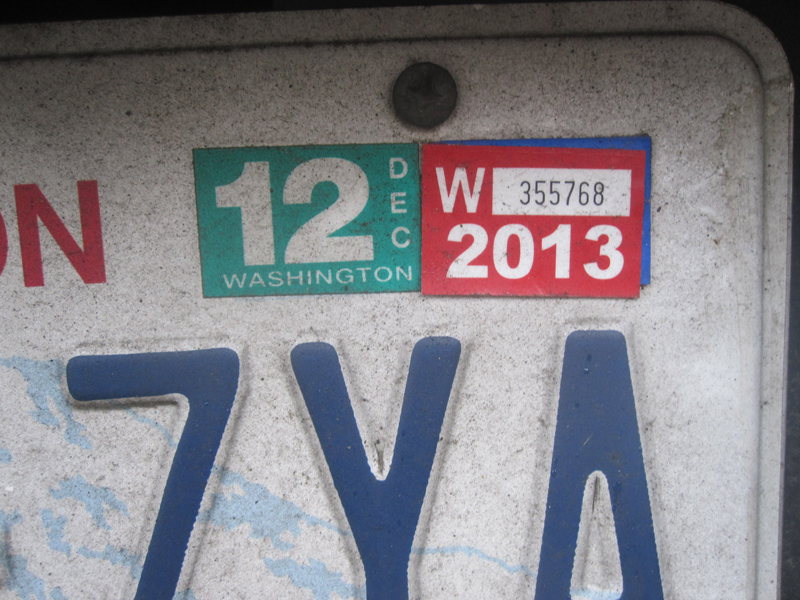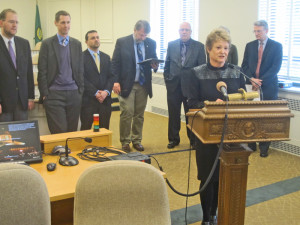OLYMPIA, Feb. 26.—It’s baaaaaack! – the car-tab tax Washington voters hated so much they voted against it twice, just to make sure it was dead. Lawmakers are considering bringing it back to life this year in a variety of guises, in a multitude of ways — all aimed at raising more money for transportation.
Remember when it cost hundreds of dollars to renew your license tabs – sometimes more than a thousand bucks? The motor vehicle excise tax, more visible than any other tax levied on the general public, probably caused more resentment than anything else state government did in the ’90s. That’s because it required motorists to write big checks to cover the bill, all at once, and because it was based on vehicle valuations that bore little relationship to market prices. It was the tax that launched the career of initiative promoter Tim Eyman, who scored his first big victory in 1999 with Initiative 695, the car-tab rollback campaign. And even before this year’s proposals get a vote, he’s threatening a repeal effort. “They’re saying let’s just recreate this monstrosity that voters keep voting against,” he says.
Hard-pressed transit districts, local governments and at least some transportation-minded lawmakers appear willing to risk a backlash. They say there just aren’t many other options. One big element got plenty of attention last week when a modest proposal to revive the tax was included in a House transportation proposal. But that’s just the start. Other proposals this year would give local governments the ability to pile their own taxes on top of it. If you add all the proposals together, some areas – particularly King County – might find themselves paying the same tax rate they did when fed-up Washington voters finally said no 14 years ago.
Some proposals would require voter approval and some would not. Some would impose a flat tax rather than an excise tax. But the effect is the same – a tax that is paid at the time car tabs are renewed. Eyman argues that if the income tax is the third rail of Washington politics, the car-tab tax is the fourth. And if government officials this year are reaching for it – it just goes to show how desperate they are.
Would Raise Billions
Gas taxes can only go part of the distance as the state contemplates spending billions on crumbling roads and new mega-projects, argues House Transportation Chair Judy Clibborn, D-Mercer Island. The transportation plan she rolled out last week would raise $10 billion over 10 years. Some of that money comes from a gas tax, the usual means of financing road construction, but as always with a transportation proposal there is a political question involved – how much can voters swallow? This one phases in a 10-cent-a-gallon increase over the next decade. That doesn’t raise enough, just $4 billion. So the rest of the money comes from other sources, from bonds that would be written against gas tax receipts decades in the future, from a variety of other taxes – and from the dreaded MVET.
The proposal, a tax rate of 0.7 percent, is relatively modest by comparison with the old tax. Back when it was junked, the rate was 2.2 percent. At the new tax rate, the owner of a $10,000 car would pay an annual tax of $70.
But still – the idea of reinstating an unpopular tax? Clibborn said the money would finance ferries, transit and local-government road projects, all of which can be defended. “I don’t know for sure what will last and will be popular, but I feel very comfortable with this.”
Just the Start
The thing is, that’s not the only proposal afoot this year. Monday afternoon in Clibborn’s committee, local government officials and transit advocates laid out the case for a series of bills that would boost local transportation taxes. Although one of them, House Bill 1865, would allow local “transportation benefit districts” to raise sales taxes without a vote of the people, all of the rest deal, in some fashion, with car tabs.
Right now those transportation districts, established in 47 cities, have the ability to impose a $20 surcharge on license tabs without a public vote. Under HB 1485, sponsored by Jake Fey, D-Tacoma, that authority would increase to $40. The proposals get bigger as they go along. HB 1953, sponsored by Marco Liias, D-Edmonds, would allow transportation districts or county governments to impose their own motor vehicle excise taxes, up to 1 percent of the value of a vehicle. A public vote would be required for that. But no public vote is required by HB 1959, sponsored by Jessyn Farrell, D-Seattle — the most expansive idea of them all. That measure applies only to King County and would allow the county council to impose the $40 surcharge together with a motor vehicle excise tax of up to 1.5 percent. Back-of-the-envelope calculations by committee staff indicate King County residents could pay as much as $130 million a year.
What’s driving the effort is the fact that sales tax revenues have plummeted since recession – the major source of revenue for local governments and transit agencies. They tell a tale of woe. Pierce Transit is planning cutbacks that will reduce service hours to half of what it was before the Wall Street meltdown. Community Transit in Snohomish County has eliminated Sunday and holiday service. King County’s Metro Transit is facing new cutbacks of 17 percent. Said Bruce Wishart of the Sierra Club, “Gas prices and other factors have driven people to transit and at the same time we are seeing reductions in revenue at the local level that make it impossible for them to maintain service, and in fact we’ve seen dramatic cuts.”
Meanwhile, cities and counties say they just don’t have enough money to keep streets in good repair. Tacoma Councilman Ryan Mello said the City of Destiny has a $1 billion backlog in street-repair needs alone. Said Seattle Councilman Tom Rasmussen, “If some of you have seen what it is like trying to get across either the low-level or the high-level West Seattle bridge at rush hours, when all the trucks from Eastern Washington are trying to get to the Port of Seattle, you know how critically important it is to get the Seattle commuters out of their cars and into the buses.”
And if local governments have the ability to raise taxes – you can bet they’ll use it, said Kirkland councilman Dave Asher. “If you give us local options, we will use them,” he said. “All the options you have laid out, in even the most generous combination, will account for less than a quarter of the needs of local governments. So you can be assured that any revenues you authorize will be needed.”
Pity the Poor Motorist
The state auto dealers association is none too keen on increasing sales taxes for transit, as one might expect – the higher the sales taxes, the harder it is to put together a car deal. And if the MVET returns, the car dealers argue that it ought to be levied only at the time of tab renewal, not at the time of purchase. You almost get the idea everyone is picking on the poor guy who drives a car, said Dave Overstreet of the American Automobile Association of Washington. Nothing against transit, he said, but the state ought to find a different way to pay for it. “The question is how we fund it and not do it on the backs of motorists all the time.”
But more intriguing is the bigger point – that lawmakers might reinstate a tax that once drove Washington voters to revolt. Part of the problem with the old tax was that it was based on the manufacturer’s suggested retail price for a car, and it automatically reduced the value each year by a fixed percentage to compensate for depreciation. As any car buyer knows, few pay full sticker, and some cars drop like a rock while others hold their value – the tax thus never reflected actual car values. And then there was the fact that it required motorists to write a whopping check once a year. Lawmakers were thunderstruck in 1999 when Eyman’s I-695 got 56 percent of the vote. Though the Supreme Court overturned the measure because it dealt with more than one subject, chastened lawmakers repealed the tax the following year. They left intact a local-option surcharge of $15 – so Eyman followed in 2002 with I-776, which wiped that out as well. And now they want to do it all over again?
Definition of Insanity
“I am reminded that the definition of insanity is doing the same thing over and over and expecting a different result,” Eyman said. “Here we are talking about a value-based motor vehicle excise tax, something the voters have said repeatedly they are not in favor of. Every single time there has been a proposal to raise car-tab fees at the local level, it has been defeated – every single time.”
Even if taxes start low, you can be sure they’ll begin creeping right back up, he said. And you can be just as sure the public will rebel again. “It is not new. It is a golden oldie, and it is an oldie the voters have said no to, over and over again. I would encourage you to move on to a different revenue source. This one is something voters find to be a totally corrupt tax.”
Big Selling Job
Transportation interests are in something of a bind, says Sen. Curtis King, R-Yakima, co-chair of the Senate Transportation Committee and Clibborn’s counterpart in the upper chamber. The MVET may not be popular, but it is one of the few taxes that holds potential to generate big money. Last week, commenting on Clibborn’s transportation plan, King said it was one of the reasons he insists that any transportation package go to a vote of the people. Lawmakers might be able to craft a tax that better reflects car values, but the public is going to have to believe in it if it is going to stick. “We have a sales job to do if we think that we are going to have the public support this package – or any other package we’ve got.”
Your support matters.
Public service journalism is important today as ever. If you get something from our coverage, please consider making a donation to support our work. Thanks for reading our stuff.








